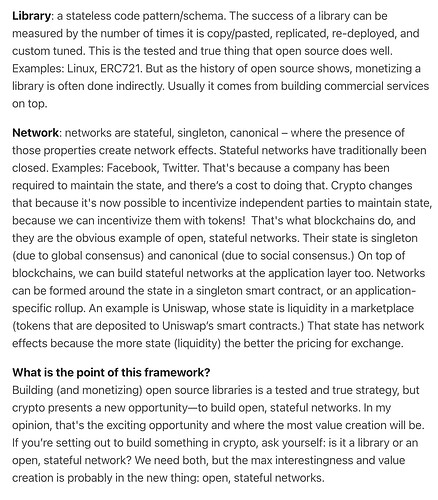Here’s an area of research (and a specific project) I’d like to do with Kernel over the summer.
The problem space
The trajectory of the web was powered by Free Software, yet the commercial models of the web never served free software authors and contributors. At best, they enable profits to accrue to hosting and enterprise support companies. Some of them offer the software authors a livable salary, but often this is with strings attached. Largely, these open source authors earn very little, and have little access to the upside they enabled for others.
The incentive system is broken. I’d like to explore solutions. Here are some thoughts:
Areas to explore
One way to frame this is, how can we keep the authors and main contributors in power? Is there a protocol we can find by defining these broken incentives as cheating?
I’m inspired by Nouns, and what they did that supports Create Commons, in a way that’s CC-native. I’d like to explore if something similar can be done for GPL, the General Public License that made Linux and much of the open web what it is today.
Harberger Taxes have some interesting resonances with hosting. For example, auctioning slots like Flashbots or making unused infrastructure “grabbale” (like lossless NFTS) can apply to hosting, and enable users to value the use of software themselves (rather than SaaS pricing plans which overoptimise for charging from non-active users). This is also a change from provider/customer commercial models to more generative coordination systems.
Quadratic Funding in it’s current form focuses applies crowd-funding patterns (and deviates from the warnings of its originators). I’d like to explore QF in a broader sense. I can imagine actual usage from actual users steers redistribution, moving effort away from drum-beating and fund-raising to building things users actually want to use. A simple starting point could redistribution of hosting revenue based on WAU (weekly active users) of various products.
Moloch DAOs could be appropriate as fractal pods maintaining decentralised infrastructure. Various modes of distributing infra (containerisation, federation) are congruent with the fractal team patterns like Raid Guild.
One of my KB5 initiatives was Cuppa which explored “If defi is made of composable primitives for capital coordination, what would the equivalent composable primitives be for effort?” I came up with a small shortlist of novel primitives, ranging from streaming money with cancellation fees (an alternative to salaries and bounties when you trust someone to define their own ways of delivering value) through to more complex ones like POAP-chains for decentralising access control. The rest were never made public, but I think they might be relevant here – especially since they serve work-value based on availability, knowledge, and creativity – all underserved by current DAO patterns.
Steps
@jsimbouras and I have been “co-mentoring” each other, and I like his staged approach to launching DAOS:
- Intention: Articulate the goal and values
- Exploration and Definition: Get input from a small group of selected advisors, aiming for consensus
- Execution: Initiate a minimal operational structure that maximizes agency and optionality of the participants
I’ve also started on the technical aspects of this, in parallel to my devops work with Kernel infrastructure. I am pretty close to launching a proof of concept that hosts Hedgedoc (which is the software you might know as HackMD( It’s a good example of the tension between open source authors and SaaS hosts). I’m setting it up on a failover pattern that I call “server alliances” that allows for fractalised, independent teams to run independent servers that support each other – creating high-availability for end users with low-cost fedeation. This will give the DAO a core service to anchor on at the start.
How can you help?
I’d like to make a shortlist of places to explore, and then “safari” them in juntos and paper parties with my Kernel peers.
What should I know about?
What coordination patterns are relevant to this?
What about technical patterns? Devops tools?
Who would make good advisors? Whose experience (success or failure) should I learn from?
